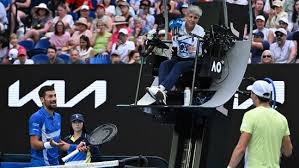
In today’s rapidly evolving business environment, leaders must understand all areas of business and adapt to new technologies. IIM Kozhikode’s Certificate in General Management Programme for Future Leaders equips you with a comprehensive understanding of finance, marketing, HR, and operations. Over 11 months, you’ll gain AI-driven insights, sharpen your leadership abilities, and develop the skills needed to navigate complex challenges and drive business growth. This programme prepares you for leadership excellence in the modern business world.
At 5-5 in the second set, the floodlights at the Rod Laver Arena were turned on, which irked Djokovic due to the sudden use of the lights in the middle of the set. Typically, stadiums wait until the conclusion of a set or consult both players on court before making such a decision, with it capable of affecting visibility and also the manner in which the ball plays.
Video of the incident captures Djokovic discussing the situation with the chair umpire, making his point originally in French, before switching to English when Faria joined the conversation.
The two players seemed to be on the same page about the situation, with Djokovic asking his opponent “We will wait for them to switch them off?”, before coming to a consensus by saying “We can wait for the end of the set if they want to switch them on.”
Faria also asked the older tennis star if he had made the request for the lights, and then added on “Me neither,” indicating that he was also not consulted regarding the decision, and that he could see fine without the lights.
The moment would resolve with the lights being turned off and play allowed to to see itself through to to the end of the set, with the crowd providing an ironic cheer as the lights went out and allowed play to resume after the brief break.
However, Djokovic looked to lose his focus just a touch at a crucial point in the set. 21-year-old Faria knuckled down and won the ensuing tiebreaker by seven points to four. Djokovic wouldn’t let that be much more than a blip, however, as he confidently won the next two sets to ensure his progression into the next match.
Djokovic is set to play world number 25 Tomas Machac of Czechia, who beat Reilly Opelka earlier in the day. Djokovic fans, however, might be slightly concerned by him dropping a pair of sets to his lower-ranked and inexperienced early-round opponents.
In today’s rapidly evolving business environment, leaders must understand all areas of business and adapt to new technologies. IIM Kozhikode’s Certificate in General Management Programme for Future Leaders equips you with a comprehensive understanding of finance, marketing, HR, and operations. Over 11 months, you’ll gain AI-driven insights, sharpen your leadership abilities, and develop the skills needed to navigate complex challenges and drive business growth. This programme prepares you for leadership excellence in the modern business world.
This programme sets itself apart by integrating emerging technologies and digital transformation, with a special focus on Generative AI. Unlike typical leadership courses that touch lightly on tech, this curriculum arms you with the skills to use AI as a strategic tool.IIM Kozhikode’s Certificate in General Management Programme integrates AI, empowering you to make data-driven decisions. This programme sharpens leadership skills, boosting strategic decision-making through AI, and prepares you to tackle complex business challenges with confidence.
As use of generative AI gains ground, the need for reskilling and upskilling becomes the order of the day, both for the employee and the employer. In its report titled Upskilling and reskilling priorities for the gen AI era, Mckinsey says, “The proliferation of generative artificial intelligence (gen AI) innovations necessitates a new approach to employee attraction, engagement, and retention. Our survey finds that compared to late adopters, companies adopting gen AI earlier place greater emphasis on talent development, with two-thirds already having a strategic approach to address their future talent and skill requirements.” Likewise, PWC in its Annual CEO Survey (2024) says that Indian CEOs will increase headcount by 5% in the next 12 months.
As use of generative AI gains ground, the need for reskilling and upskilling becomes the order of the day, both for the employee and the employer. In its report titled Upskilling and reskilling priorities for the gen AI era, Mckinsey says, “The proliferation of generative artificial intelligence (gen AI) innovations necessitates a new approach to employee attraction, engagement, and retention. Our survey finds that compared to late adopters, companies adopting gen AI earlier place greater emphasis on talent development, with two-thirds already having a strategic approach to address their future talent and skill requirements.” Likewise, PWC in its Annual CEO Survey (2024) says that Indian CEOs will increase headcount by 5% in the next 12 months.



